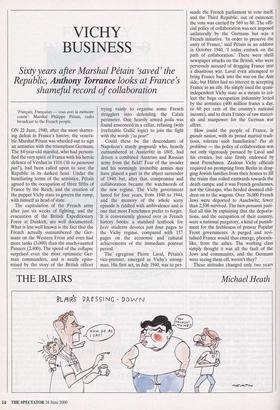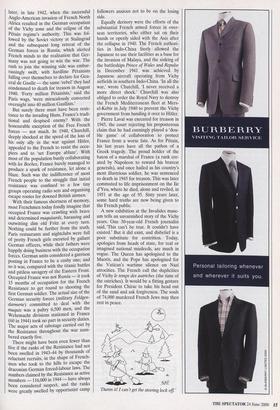VICHY BUSINESS
Sixty years after Marshal Petain 'saved' the shameful record of collaboration
`Francais, Francaises — vous avez la memoire courte': Marshal Philippe Petain, radio broadcast to the French people.
ON 22 June, 1940, after the most shatter- ing defeat in France's history, the venera- ble Marshal Main was wheeled out to sign an armistice with the triumphant Germans. The 84-year-old marshal, who had personi- fied the very spirit of France with his heroic defence of Verdun in 1916 (`ils ne passeront pas!'), had been called upon to save the Republic in its darkest hour. Under the humiliating terms of the armistice, Petain agreed to the occupation of three fifths of France by the Reich, and the creation of the puppet Vichy state to govern the rump, with himself as head of state.
The capitulation of the French army after just six weeks of fighting, and the evacuation of the British Expeditionary Force at Dunkirk, are well documented. What is less well known is the fact that the French actually outnumbered the Ger- mans on the Western Front and even had more tanks (3,000) than the much-vaunted Panzers (2,400). The speed of the collapse surprised even the most optimistic Ger- man commanders, and is neatly epito- mised by the story of the British officer trying vainly to organise some French stragglers into defending the Calais perimeter. One heavily armed poilu was found ensconced in a cellar, refusing (with irrefutable Gallic logic) to join the fight with the words Tai peur!'
Could these be the descendants of Napoleon's sturdy grognards who, heavily outnumbered at Austerlitz in 1805, had driven a combined Austrian and Russian army from the field? Fear of the invader and his seemingly invincible armies may have played a part in the abject surrender of 1940, but, after that, compromise and collaboration became the watchwords of the new regime. The Vichy government lasted for four years, from 1940 to 1944, and the memory of the whole sorry episode is riddled with ambivalence and is one that most Frenchmen prefer to forget. It is conveniently glossed over in French history books: a standard textbook for bicee students devotes just four pages to the Vichy regime, compared with 157 pages on the economic and cultural achievements of the immediate postwar period.
The egregious Pierre Laval, Petain's vice-premier, emerged as Vichy's strong- man. His first act, in July 1940, was to per- suade the French parliament to vote itself, and the Third Republic, out of existence; the vote was carried by 569 to 80. The offi- cial policy of collaboration was not imposed unilaterally by the Germans but was a French initiative. 'In order to preserve the unity of France,' said Petain in an address in October 1940, 'I today embark on the path of collaboration.' There were shrill newspaper attacks on the British, who were perversely accused of dragging France into a disastrous war. Laval even attempted to bring France back into the war on the Axis side, but Hitler had no interest in accepting France as an ally. He simply used the quasi- independent Vichy state as a means to col- lect the huge occupation indemnity levied by the armistice (400 million francs a day, or 60 per cent of the country's national income), and to drain France of raw materi- als and manpower for the German war effort.
How could the people of France, la grande nation, with its proud martial tradi- tions, tolerate such humiliation? Pas de probleme — the policy of collaboration was not only vigorously pursued by Laval and his cronies, but also firmly endorsed by most Frenchmen. Zealous Vichy officials required no prompting from Berlin in drag- ging Jewish families from their homes to fill the trains that rolled eastwards towards the death camps; and it was French gendarmes, not the Gestapo, who herded doomed chil- dren on to the wagons. Over 76,000 French Jews were deported to Auschwitz; fewer than 2,500 survived. The bien-pensants justi- fied all this by explaining that the deporta- tions, and the occupation of their country, were a national purgatory, a kind of punish- ment for the feebleness of prewar Popular Front governments. A purged and revi- talised France would thus emerge, phoenix- like, from the ashes. The working class simply thought it was all the fault of the Jews and communists, and the Germans were seeing them off, weren't they?
These attitudes changed only two years later, in late 1942, when the successful Anglo-American invasion of French North Africa resulted in the German occupation of the Vichy zone and the eclipse of the Petain regime's authority. This was fol- lowed by the Soviet victory at Stalingrad and the subsequent long retreat of the German forces in Russia, which alerted French minds to the realisation that Ger- many was not going to win the war. The rush to join the winning side was embar- rassingly swift, with hardline Petainists falling over themselves to declare for Gen- eral de Gaulle — the same 'rebel' they had condemned to death for treason in August 1940. 'Forty million Petainists,' said the Paris wags, 'were miraculously converted overnight into 40 million Gaullists.' But surely there must have been resis- tance to the invading Huns, France's tradi- tional and despised enemy? With the honourable exception of the Free French forces — not much. In 1940, Churchill, deeply shocked at the speed of the loss of his only ally in the war against Hitler, appealed to the French to resist the occu- piers and to 'set Europe ablaze'. With most of the population busily collaborating with les Boches, France barely managed to produce a spark of resistance, let alone a blaze. Such was the indifference of most French people to the struggle that initial resistance was confined to a few tiny groups operating radio sets and organising escape routes for downed British airmen. With their famous shortness of memory, most Frenchmen today fondly imagine that occupied France was crawling with brave and determined maquisards, harassing and outwitting dim old Fritz at every turn. Nothing could be further from the truth. Paris restaurants and nightclubs were full of pretty French girls escorted by gallant German officers, while their fathers were happily doing business with the occupation forces. German units considered a garrison posting in France to be a cushy one; and so it was, compared with the titanic battles and pitiless savagery of the Eastern Front. Occupied France was not Russia — it took 15 months of occupation for the French Resistance to get round to shooting the first German soldier. The actual size of the German security forces (military Feldgen- darmerie) committed to deal with the maquis was a paltry 6,500 men, and the Wehrmacht divisions stationed in France (60 in 1944) took no part in security duties. The major acts of sabotage carried out by the Resistance throughout the war num- bered exactly five. There might have been even fewer than five if the ranks of the Resistance had not been swelled in 1943-44 by thousands of reluctant recruits, in the shape of French- men who took to the hills to escape the draconian German forced-labour laws. The numbers claimed by the Resistance as active members — 116,000 in 1944 — have always been considered suspect, and the ranks were greatly swelled by opportunist camp followers anxious not to be on the losing side.
Equally derisory were the efforts of the substantial French armed forces in over- seas territories, who either sat on their hands or openly sided with the Axis after the collapse in 1940. The French authori- ties in Indo-China freely allowed the Japanese to use their facilities as a base for the invasion of Malaya, and the sinking of the battleships Prince of Wales and Repulse in December 1941 was achieved by Japanese aircraft operating from Vichy airfields in southern Indo-China. 'In all the war,' wrote Churchill, 'I never received a more direct shock.' Churchill was also obliged to order the Royal Navy to destroy the French Mediterranean fleet at Mers- el-Kebir in July 1940 to prevent the Vichy government from handing it over to Hitler.
Pierre Laval was executed for treason in 1945, the court rejecting his preposterous claim that he had cunningly played a 'dou- ble game' of collaboration to protect France from a worse fate. As for Petain, his last years have all the pathos of a Greek tragedy. The proud holder of the baton of a marshal of France (a rank cre- ated by Napoleon to reward his bravest generals), and once hailed as his country's most illustrious soldier, he was sentenced to death in 1945 for treason. This was later commuted to life imprisonment on the Ile d'Yeu, where he died, alone and reviled, in 1951 at the age of 95. Sixty years later, some hard truths are now being given to the French public.
A new exhibition at the Invalides muse- um tells an unvarnished story of the Vichy years. One 30-year-old French journalist said, 'This can't be true. It couldn't have existed.' But it did exist, and disbelief is a poor substitute for contrition. Today, apologies from heads of state, for real or imagined national misdeeds, are much in vogue. The Queen has apologised to the Maoris, and the Pope has apologised for the Vatican's wartime silence on Nazi atrocities. The French call the duplicities of Vichy le temps des autriches (the time of the ostriches). It would be a fitting gesture for President Chirac to take his head out of the sand and ask forgiveness. The souls of 74,000 murdered French Jews may then rest in peace.
Damn it! I can't get the steering lock off'



































































 Previous page
Previous page